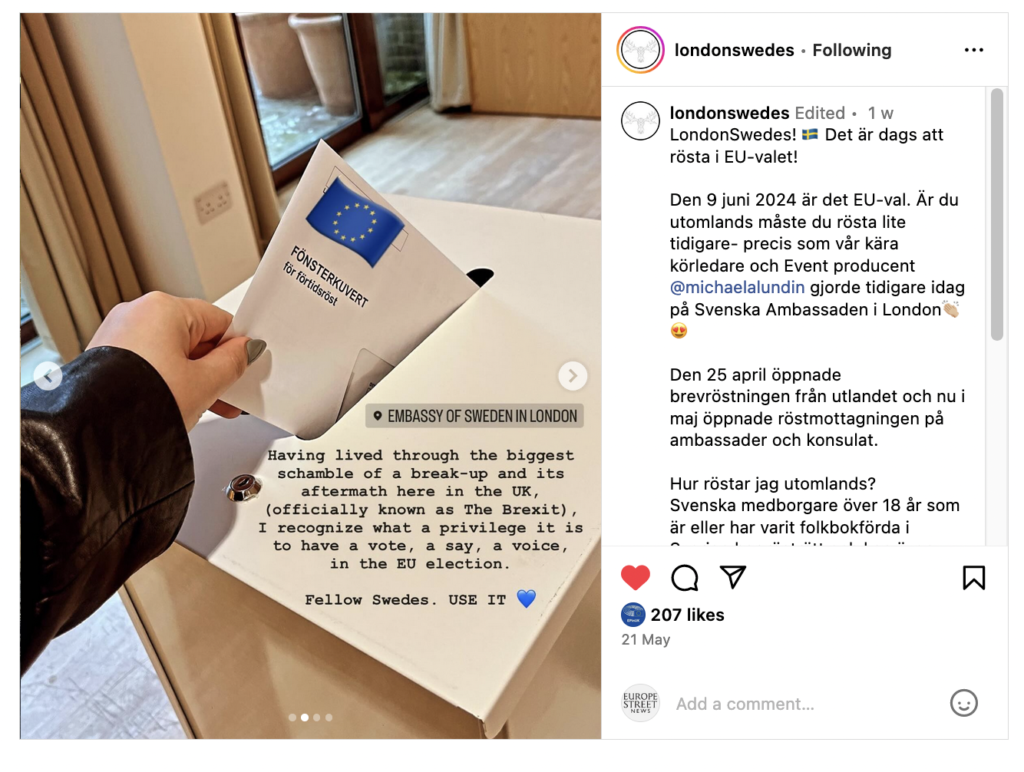“Bittersweet moment”: what EU citizens in the UK think about the European elections
Even though the UK is no longer an EU member, millions of EU citizens in the country retain the right to vote in the European Parliament elections this week, the first after Brexit.
While the elections officially take place between 6 and 9 June, EU citizens in the UK have already started to vote at embassies, consulates or by post. How do they feel about these elections and how many will cast their ballot?
A group of UK-based European publications that have worked together to inform EU citizens about their voting rights have asked their views.
As El Ibérico notes, many are voting with Brexit in mind. Some feel a sense of responsibility, while others are detached from the EU or critical about the modalities of the vote.
Víctor Jiménez, a Spanish citizen who works in financial journalism, told El Ibérico he will vote because he is concerned about the extreme right in North America campaigning “against values that we consider fundamentally European, fundamentally democratic… values that align more closely with the European Union since Brexit”.
“Of course I will vote. As a European citizen I want members of parliament who represent citizens and who advance issues that matter to me, such as support for Ukraine,” said Ferran Nogeroles, a computer systems expert and long-term resident in England.
Eduardo Ramos, also in IT, said he always saw the European Union as “a bureaucratic machine”, an even “more ineffective” one when faced with the Israel-Palestine conflict. But he also believes it is a “guarantee of democracy” for Spain.
Some 130,000 Spaniards are registered with Spanish authorities in London, Edinburgh and Manchester. They can cast their vote at consulates from 1 to 6 June or by post before 4 June.
Some do not intend to vote as they feel a “distance from the EU”, like actress Montserrat Roig de Puig. “I have always seen the European elections as an internal consultation between them, not for ordinary people,” she said. But Brexit made her appreciate more “the rights I have as a European”, she added.
“Still unhealed from the trauma of Brexit”
Responses to a Facebook survey by Romanian news outlet Ziarulu Românesc varied. Most respondents said they would vote, some they wouldn’t, while others said they did not know how.
The over 550,000 Romanians who live in the UK, according to the 2021 census, can vote on 9 June in polling stations around the country.
Podcast producer Bogdan Cronț told Ziarulu Românesc: “Living in the UK, it is probably bittersweet for many of us to talk about the European Parliament election… The echoes of Brexit, although tempered, are still alive… but Romanians are Europeans, and the UK is also a European country that maintains close relations with EU member states”.
Lawyer Remus Robu, who is married to a Spaniard, also plans to vote. “I am European at heart and still unhealed from the trauma of Brexit,” he said. His connections to Europe remain strong as his children will study there and he still has professional contacts with colleagues outside the UK.
The around 45,000 Swedish in the UK started to vote earlier in May at the embassy, at consulates or by mail.
A post on the Instagram account of London Swedes, the website for the Swedish and Scandinavian community, says: “Having lived through the biggest shamble of a break-up and its aftermath here in the UK (officially known as The Brexit), I recognise what a privilege it is to have a vote, a say, a voice, in the EU elections”.

“Unable to vote”
For the first time, because of Brexit, the over 500,000 Italians in the UK will have to go to Italy if they want to vote.
Only people who live in another EU member state can vote at Italian consulates for the European Parliament elections. Postal or proxy vote is not possible.
News outlet Londra Italia surveyed readers about these arrangements and the vast majority of responses conveyed anger and disappointment. 97% called the situation “an injustice” and an “anti-democratic decision”. Only 6% said they would go to Italy to vote, although 94% would have liked to participate.
“It is not the fault of Italians residing in GB if the country decided to leave the EU,” one would-be voter said.
“It is an entirely Italian anomaly,” another respondent argued. “My partner, a French citizen, will vote easily at her consulate in London.”
But several French citizens said they would not vote because of the cost and time required to travel to London, reports French Morning London. A couple complained about having to pay £70 to travel from Cambridge to Wembley.
Clémence, also based in Cambridge, will vote, however, mainly to push back against far-right representation in the European Parliament. “It’s too important,” she said. Clémence did not vote in 2019 but now she understands that “the European Union is much more than the CAP [common agricultural policy]” and that the parliament could “encourage or impose certain practices, such as ending the use of plastic bags”.
Another French national, Sabrina, will vote by proxy. She considers voting a matter of rights and duties, and thinks it should be made compulsory. Brexit “proved the importance of the parliament” in negotiations with the UK, she said.
She thinks the European Parliament plays a central role in the daily lives of French citizens, as “many European laws override national laws and are therefore as important as those voted in the French parliament.”
Claudia Delpero, Europe Street News © all rights reserved
This article is published in cooperation with El Ibérico, French Morning London, Londra Italia, Londynek and Ziarul Românesc as part of a public information project about the European elections funded by the European Parliament office in London.
Photo by Luke Tanis on Unsplash
Europe Street News is a news service on the European Union and citizens’ rights. We are fully independent and we are committed to providing factual, accurate and reliable information. As citizens’ rights are at the core of democracy, our website and newsletter are free to read. Please consider making a contribution of your choice using this link or the menu below so we can continue and expand our coverage. We are always happy to hear your suggestions and ideas for improvement. Thank you!




